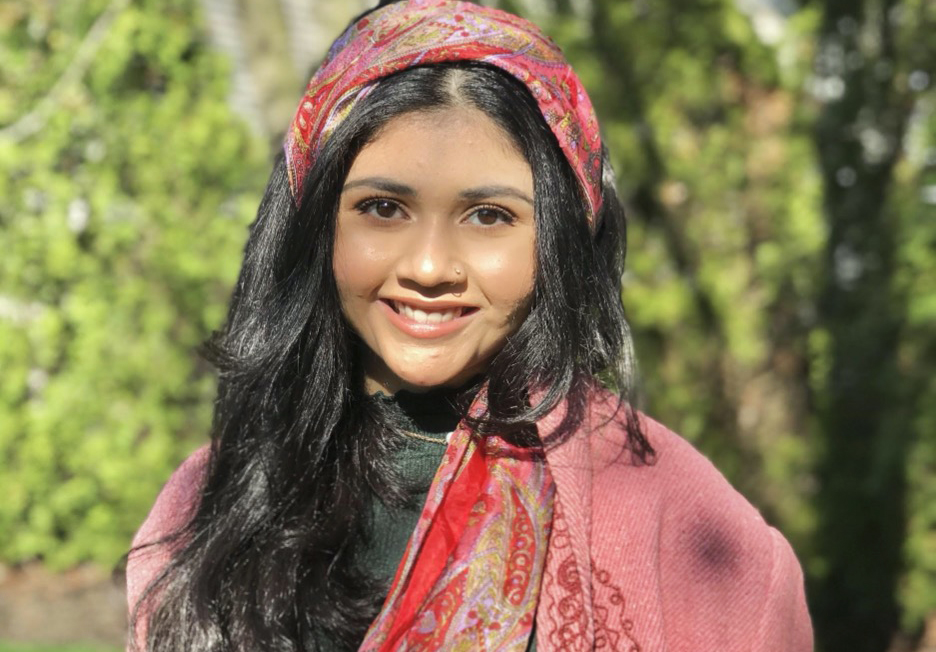Public Health Buckeyes: Dena Hussain
Third-year BSPH student finds place in public health

Dena Hussain, a third-year undergraduate student specializing in public health sociology uses her diverse academic and student-involvement experiences to shape a promising path toward graduate school and a career in public health or social work.
Why did you decide to pursue public health?
Before entering college, I had no idea what I wanted to major in. I used to tell people I wanted to study something in the “health field” or go on a pre-med track — I had no clue public health existed as a discipline or major. The first time someone explained to me what public health is, I knew it was what I wanted to pursue. Public health aligned with all the interests I had regarding health and society, such as understanding health disparities, looking at health on a population level and studying the role of social structures in community health outcomes. I have never looked back since moving forward in my degree.
Can you tell us a bit about your goals after graduating?
Although I’m still learning along the way, a few of my goals after graduating include furthering my education in public health or perhaps social work. I would love to gain experience working with underserved children and being a source of support for them. I see children as interesting and active agents in society, and I love learning about child development. Another goal of mine would be to work on a community health promotion project. It would be a fascinating and rewarding experience to work on public health infrastructure in Pakistan, where my father was born and raised, specifically in the northern mountainous regions.
Are you involved in any research, internships or academic/student activities?
Previously, I worked as a pharmacy technician trainee at the College of Pharmacy’s Medication Management Program, where I called patients enrolled in Medicare and Medicaid to complete annual reviews and helped ensure medication compliance. I also served as the arts chair for the Muslim Interscholastic Tournament, an annual tournament engaging high schoolers throughout the U.S. and Canada.
Currently, I’m the outreach chair for the Muslim Students’ Association at Ohio State, for which I reach out to other student and off-campus organizations to plan and execute events, build relationships and provide resources to our members. I’m also a Wellness Warriors intern at Buckeye Wellness, where I strive to promote wellness among individuals at the College of Public Health and university by creating weekly wellness PDFs, working on the Buckeye Wellness website and planning wellness events.
How have these experiences enriched your time at Ohio State?
These experiences have enriched my time at Ohio State by allowing me to take on multiple roles in different environments. Through these roles, I’ve gained valuable and transferable skills — such as leadership, organization, communication — that I can take with me as I move forward in my future.
What advice would you give incoming students?
I would advise incoming students to talk with their peers, especially older students who may have gone through the same struggles new students are facing. By doing this, incoming students can gain inspiration for how they want to spend their time at Ohio State, receive guidance on how to adjust to the college curriculum, relate to their peers and feel an overall sense of belonging and comfort at college. Although it may be cliché advice, it’s important to trust the process when trying to figure out a major or career path while still taking proactive steps to build a successful future.
How do you see your education shaping your future?
I see my education as a means of accessing endless opportunities and possibilities for my future. My education will help shape me as an individual and what I believe in — my morals, values and how I go about interacting with those around me. I believe education isn’t just something you apply in the classroom but something that’s part of everyday interactions and thought processes. I believe viewing education this way makes for a better, less-ignorant society and promotes acceptance and empathy.
About The Ohio State University College of Public Health
The Ohio State University College of Public Health is a leader in educating students, creating new knowledge through research, and improving the livelihoods and well-being of people in Ohio and beyond. The College's divisions include biostatistics, environmental health sciences, epidemiology, health behavior and health promotion, and health services management and policy. It is ranked 22nd among all colleges and programs of public health in the nation, and first in Ohio, by U.S. News and World Report. Its specialty programs are also considered among the best in the country. The MHA program is ranked 5th and the health policy and management specialty is ranked 21st.